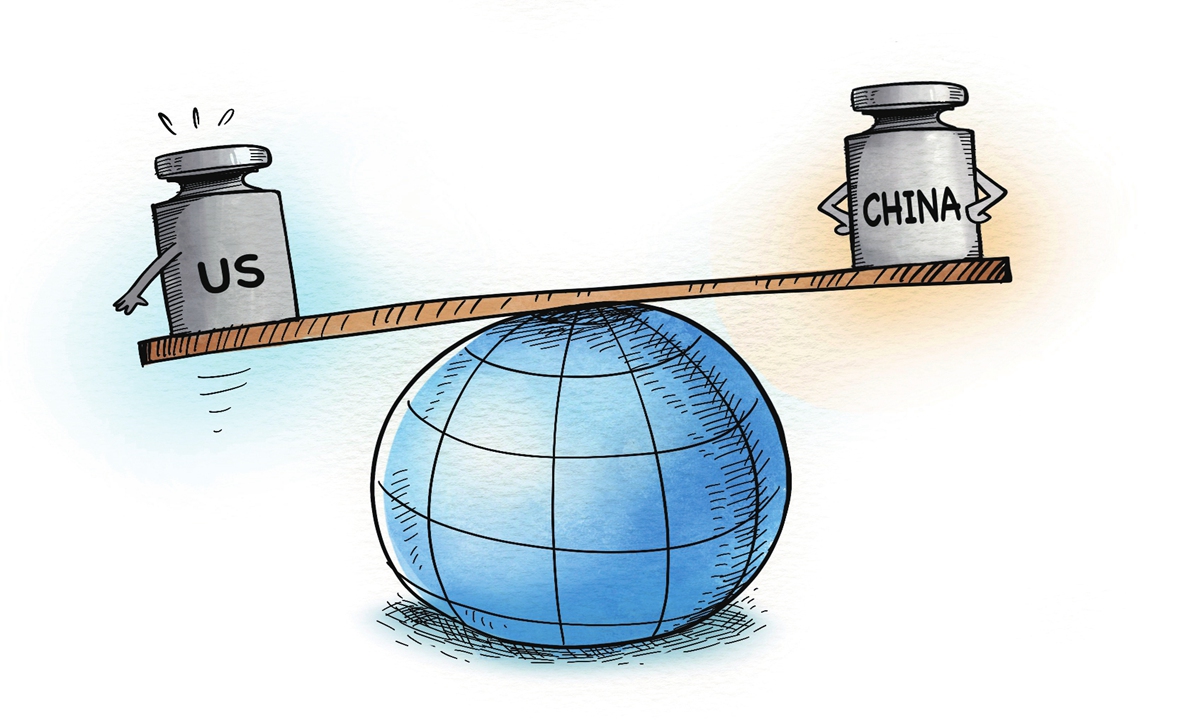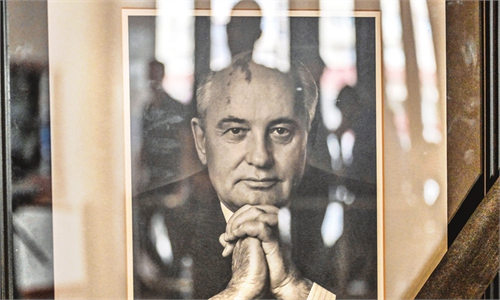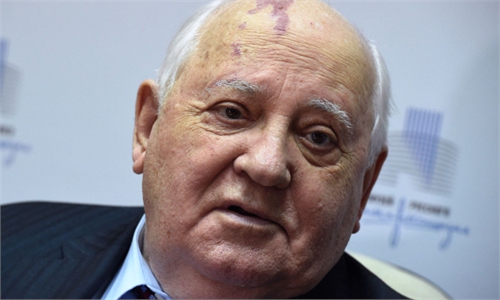
US China Illustration: Liu Rui/GT
Former leader of the Soviet Union (USSR) Mikhail Gorbachev, who briefly served as its first-ever and only president, passed away on August 30. Countless condolences from foreign officials and average folks alike poured in from across the West due to his historical role in peacefully "ending" the Cold War. It was under his leadership that Soviet troops withdrew from Central and Eastern Europe, Germany reunited, and his superpower collapsed along the lines of its 15 constituent republics into independent states.
These outcomes were praised across the West because the USSR's geopolitical opponents were happy that he oversaw the end of the bipolar world system that had hitherto kept the US in check to a certain extent. This paradigm shift in international relations is mis-portrayed as having been "inevitable" in Western historiography after American political scientist Francis Fukuyama infamously postulated about the so-called end of history at the closing days of the Cold War.
Those leaders who enthusiastically embraced Fukuyama's supremacist views believed that their models were superior to all others and would "inevitably" spread across the planet to bring about US-led uniformity. The result, however, was that the remaining superpower aggressively imposed its socioeconomic and political systems across most of the world, directly leading to disasters in the former Yugoslavia, Afghanistan, Iraq, Libya, Syria, and elsewhere.
Contrary to everything that Westerners nowadays claim, none of this was indeed "inevitable." Rather, it was the result of Gorbachev's well-intended but ideologically misguided efforts to reform the USSR following the socioeconomic stagnation that set in prior to his assuming power. His policies of "glasnost" (openness) and "perestroika" (restructuring) sought to breathe new life into his superpower's society and economy respectively, but in hindsight were the reason why its existential crises spiraled out of control.
There was nothing wrong with Gorbachev acknowledging the shortcomings of his superpowers' systems and consequently improving upon them, especially after events elsewhere across the world confirmed that they were becoming uncompetitive and unintentionally leading to domestic instability. Western economies were growing while the Soviet economy was stagnating, which occurred in parallel with Western information warfare narratives infiltrating their geopolitical opponent's diverse society.
Something clearly had to be done, but what Gorbachev ended up doing ultimately doomed the Soviet Union to the dustbin of history. Instead of retaining the leading role of the ruling Communist Party of the Soviet Union (CPSU) over society in responsibly guiding all aspects of affairs, he gradually reduced it to the point where it lost control over all socioeconomic and political processes, setting into motion the irreversible disintegration of his superpower.
The laissez-faire attitude that he was influenced to apply by his Western peers who effusively praised such reforms in ways that were clearly designed to manipulate his well-intended desire to reform the Soviet Union can be interpreted as targeted information warfare. After all, no one's ideologically driven geopolitical opponents in that tense Cold War context would ever applaud something that their rival was doing unless it stood to advance their own zero-sum interests at their counterpart's expense.
They maliciously employed a combination of praise and promises of guaranteeing him the most positive historical legacy possible to manipulate his mind-set in ways that pushed him to make the worst choices possible for his superpower. Gorbachev was led down the path of abandoning the Soviet Union's communist ideology in favor of unquestionably imposing Western socioeconomic and political models, which were incompatible with its structure and thus catalyzed a self-sustaining cycle of domestic crises.
Everything that unfolded on the home front could have been averted had the CPSU retained its leading role over society, but this was incompatible with Gorbachev's ideologically misguided worldview that was influenced by his Western opponents as part of their malicious intentions to destroy the USSR. The domestic chaos created by his disastrous decisions made it impossible for Moscow to simultaneously manage its international and internal responsibilities, hence why it quickly retrenched and collapsed.
By contrast, the Communist Party of China (CPC) pioneered a completely different path around the same time whereby its visionary leadership led by late leader Deng Xiaoping proactively charted far-reaching economic reforms while preserving its supervisory role over everything. He respected the Party's responsibility to society and knew that abandoning it for foreign-influenced and ideologically misguided reasons like his Soviet peer was in the process of doing would doom the Chinese people.
China and the USSR therefore both implemented their own set of comprehensive reforms but achieved polar opposite outcomes. China improved its people's living standards in historically unprecedented ways while retaining the unity of China's diverse civilization whereas the USSR destroyed its people's living standards in historically unprecedented ways while dissolving the unity of the USSR's diverse civilization.
Furthermore, the Soviet Union's collapse suddenly ended the bipolar world system that had hitherto kept the US in check to a certain extent while China's peaceful rise as a major power ultimately resulted in sparking the global systemic transition to multipolarity which is progressively restoring balance to the declining unipolar system that Gorbachev was inadvertently responsible for having created. Their international legacies are therefore altogether different due to the different roles of their ruling parties.
Moreover, countless people across the Global South died due to the indirect consequences of the former Soviet leader's well-intended but ideologically misguided decisions while countless people across the Global South have seen their lives vastly improved due to the direct consequences of the China-proposed Belt and Road Initiative. This objectively existing and easily verifiable observation proves that China's humanitarian legacy was thus ultimately better in all respects than the USSR's.
In closing, the lesson to be learned by dwelling upon Gorbachev's life on the occasion of his passing is that "the path to hell is paved with good intentions." Even the most well-intended people can end up having the worst legacies imaginable if they're ideologically misguided by hegemonic forces, just like he had been. If Gorbachev was truly so great, then he'd be equally praised across the Global South just as much as he is across the West, but the latter only eulogizes him because he inadvertently advanced their interests.
The author is a Moscow-based American political analyst. opinion@globaltimes.com.cn



